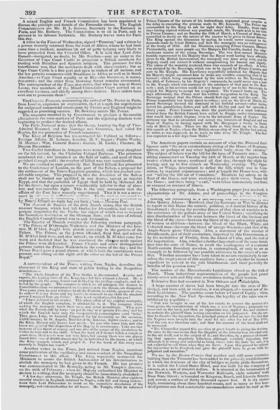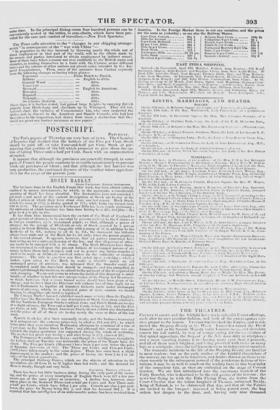Tile American papers contain an account of what the National
ha& ligencer calls "tire most extraordinary sitting of the House of' Represen- tatives, or perhaps of any other legislative body. since the creation," The subject of debate was the bill for the issue of Treasury notes, The sitting commenced on Tuesday. the 24th of March. at the regular hour, twelve o'clock at noon ; continued all that day, through the night fol- lowing, and up to five o'clock on Wednesday evening. The Oppo- sition, or Whigs, determined to defeat the bill, which was in Com- mittee, by repeated adjournments; and at length the House rose, with- out " taking the bill out of Committee." Members lay asleep on the floor of the House, and were awakened to give their votes. Some left the House ; and there being " a call," were taken into custody and fined, or excused on account of illness.
The following paragraph, from a 'Washington paper just received, is characteristic of Mr. Adams, and of proceedings in the Congress.
1,11G resininunni ital.:Lau/5 .tacs cut. Jolla Qutney Adams : Resolved, that the Secretary at War be directed to report to this House the natural, political, and martial history of the bloodhound ; showing the peculiar fitness of that class of warriors to be the associates of' time gallant army of the United States ; specifying,the nice discrimination of his scent between the blood of' the freeman and the blood of the slave—between the blood of the armed warrior and that of womeu or children—between the blood of the Black, White, and Coloured man—between the blood of savage Seminoles and that of the Anglo-Saxon pious Christian. Also, a statement of the number of bloodhounds, and of their conductors, imported by this Government, or by the authorities of Florida, from the island of' Cuba, and the cost of the importation. Also, whetiser a further importation of the same heroic race into the state of Maine, to await the contingency of a contested North-eastern Boundary question, is contemplated, or only to set as example to be followed by our possible adversary hi the event of a con- flict. Whether measures have been taken to secure exclusively to our- selves the employment of this auxiliary force ; and whether he deems it expedient to extend to the said bloodhounds and their posterity the benefits of the pension-laws.'"
The session of the Massachusetts legislature closed on the 24th of March. These industrious representatives of the people had passed ninety-seven acts and fifty-nine resolutions during timely session. Extensive fires had occurred in New Orleans and Itiladelphia.
A large number of slaves had been brought into the state of Mis-
sissippi, and been sold, its violation, it was alleged, of a recent act of' the State Legislature. The question came before a Court of Equity ; when, according to the New York .S'pcetator, the legality of the sales was es- tablished by a quibble- 4, Suit was brought in one of the law courts to recover the amount of a bond given, the consideration of which was a sale of "Negroes ; judgment was recovered on the bond, and then tut injuuctiou was applied for, and obtained, to restrain the plaintiff from issuing execution on his judgment. On the leo. Lion to dissolve the injunction, the principal ground relied on was the fact that the Negroes were brought into the state for sale alter the 1st of May 1t33; that time sale was therelore void; and that the amount of Nye bond could not be recovered.
"The Chancellor argued this qmstion at great length hi giving his decision. Ile came to the conclusion that the illegality of the introduction attached only to the act itself; not to the subject of it ; and thereffire, by a process of reason- ing that appears siogularly ffillacious, although certainly hoondous, that although it is wrong a w aural unlawful to bring slaves into the state 'for sale, it is not unlawful to sell them when they are there. Upon this ground lie ordered the injunction to he dissolved, and gave the plaintiff leave to go on with his judgment and execution."
We see by the Boston Courier that another and still more extensive buiding thins the Tremont has been added to the princely establishments in which the denizens of' the city oh' bridges so justly pride themselves. It is called the United States Hotel, and was built Ibr the company of owners, at a cost of 200,000 dollars. It is situated at the termination of the Norwich, Western, and 'Worcester Railroads, eight minutes' walk from State Street ; is hounded on Kingston, Beach, and Lincoln Streets; and covers a surface of thirty thousand square feet. It is six stories high, containing about three hundred rooms, and as many as five hun- dred persons can find comfortable accommodations under its roof at the
sa ti
me me. In the principal dining-room four hundred persons can be conveniently seated at the tables, in arm-chairs, which have been pro- vided for the ease and comfort of travellers.—Nmo York Spectator.



























 Previous page
Previous page